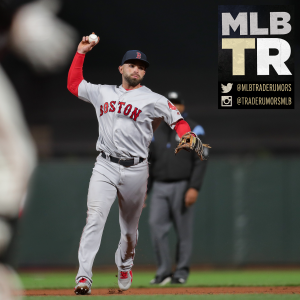Jose Peraza was linked to the Orioles, Indians, and two other unknown teams this offseason, though Peraza tells Peter Abraham of the Boston Globe that he heard from eight or nine clubs while on the open market. Peraza chose to sign with the Red Sox because of their recent success (“It’s a great place to play baseball if you want to win a championship“) and the opportunity they presented for regular second base work. “Second base is my most comfortable position. I played a lot of second base in the minors. I know I can help this team playing there,” Peraza said. He saw quite a bit of second base action over his four seasons in Cincinnati, though the Reds gave Peraza more time as a shortstop (almost exclusively so in 2018) and also used him as an outfielder. Peraza might get some utility action with the Sox but will likely see the most action as Boston’s first-choice option at the keystone.
More from around the baseball world…
- The title of Keith Law’s latest piece for The Athletic (subscription required) says it all: “How do you prepare for the draft when there are no games to watch?” Law speaks to several sources from teams and the league itself about how the 2020 amateur draft will be impacted by the COVID-19 shutdown, as universities and high schools have already halted their seasons. Some of the draft’s top prospects, therefore, will have had little or no chance to play in front of scouts in weeks or even at all by the time the draft rolls around on June 12. Pushing the draft back altogether could be an option, and other ideas suggested include holding prospect combines or “thrown-together tournaments” (in the words of one GM) so evaluators could look at the players in both workout and game scenarios. There is no perfect solution to solve such a major interruption in the usual pre-draft process, of course, though Law suggests that Major League Baseball should “work with amateur institutions to waive the typical restrictions on amateur players. Nobody’s eligibility should be at stake here, not in these extraordinary circumstances.”
- The Cardinals “will not make any [transactions] until we have more clarity on what the future holds,” president of baseball operations John Mozeliak told Rick Hummel of the St. Louis Post-Dispatch. This means everything from roster cuts, minor league assignments, releases, or any other moves that would have been expected within the next week had Spring Training progressed as per usual. Despite some speculation on the subject, the league didn’t issue an official freeze on roster moves while the next steps are figured out during this shutdown period, even though some veterans on minor league contracts are approaching the opt-out dates in their contracts. A couple of teams have made some minor league re-assignments in the interim, while the Nationals made the most notable move in releasing Hunter Strickland and David Hernandez.
- “The longer the delay lasts, the longer it will take for the pitchers to reset, to rebuild,” ESPN.com’s Buster Olney writes about a timeline for the “second Spring Training” that will be required should the season get back on track. The latest reports suggest that late May or early June could be earliest date for a new Opening Day, and should the season be delayed until closer to mid-summer, “some staffers believe something close to a month…will be required to get the pitchers up to speed.” This is yet another complication facing the league and the MLBPA over the coming weeks or months as they try to work out what will be a heavily-reduced schedule.

